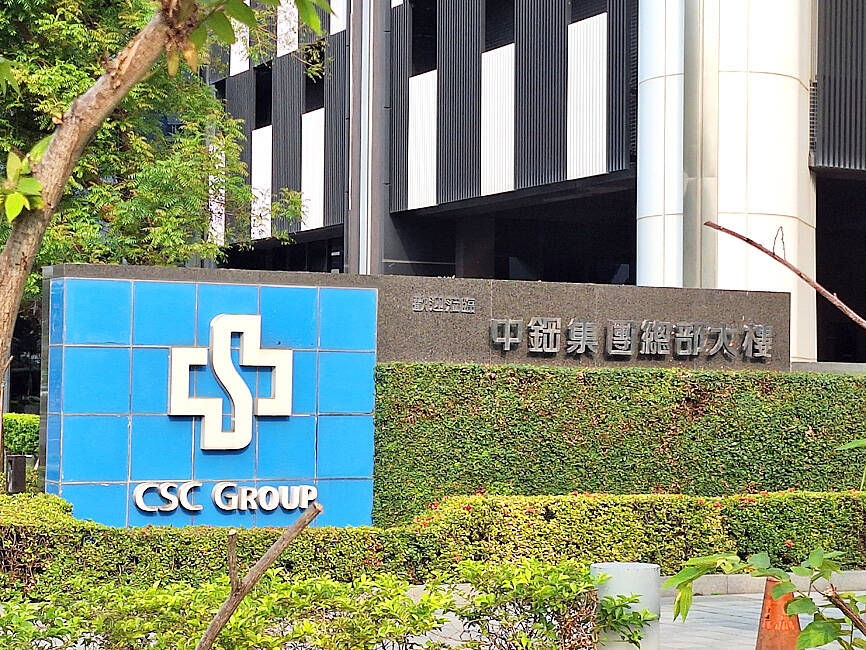China Steel Corp (CSC, 中鋼), Taiwan’s biggest steelmaker, yesterday said its pretax loss shrank to NT$840 million (US$27.45 million) last month, from a loss of NT$1.58 billion a month earlier, due to improved gross margin.
The company also reported an increase in non-operating income from renewable energy subsidiary Zhong Neng Offshore Wind Farm (中能離岸風電) and higher dividend income from its mining investments.
Zhong Neng, an offshore wind farm off the coast of Changhua County, sold 46.21 million kilowatt-hours (kWh) of electricity last month, up from 22.46 million kWh a month earlier, the wind farm said in its monthly report.

Photo: CNA
Zhong Neng is a project codeveloped by CSC and Copenhagen Infrastructure Partners, but is now fully owned by CSC’s subsidiary Zhong Fa Holding Limited (中發控股).
During the first seven months, CSC accumulated NT$2.41 billion in pretax losses, reversing a pretax profit of NT$4.08 billion during the same period last year, the statement said.
CSC attributed the worse financial performance to a reduction steel shipments and lower average selling prices, leading to revenue decline and larger operating losses on an annual basis, a statement said.
Meanwhile, higher mining costs drove up expenditures from non-operating items, it said.
Revenue dropped 11 percent year-on-year to NT$192.66 billion in the first seven months of this year, from NT$217.6 billion, CSC said.
The company shipped a total of 4.36 million tonnes during the January to last month period, it said.
The company said it is positive about the steel industry’s outlook for the rest of this year, given that the easing global trade situation and potential rate cuts by the US Federal Reserve by the end of the year would lead to a recovery in demand.
CSC expects the global steel market to stabilize, supported by steady US and European demand, and China’s efforts to curb excessive production and lower inventory.
China’s Baoshan Iron & Steel Co (寶鋼) and Vietnam-based Formosa Ha Tinh Steel Corp (台塑河靜鋼鐵興業) earlier this month raised some steel prices by 200 yuan (US$28) and US$11 per tonne respectively, CSC said.

NEW IDENTITY: Known for its software, India has expanded into hardware, with its semiconductor industry growing from US$38bn in 2023 to US$45bn to US$50bn India on Saturday inaugurated its first semiconductor assembly and test facility, a milestone in the government’s push to reduce dependence on foreign chipmakers and stake a claim in a sector dominated by China. Indian Prime Minister Narendra Modi opened US firm Micron Technology Inc’s semiconductor assembly, test and packaging unit in his home state of Gujarat, hailing the “dawn of a new era” for India’s technology ambitions. “When young Indians look back in the future, they will see this decade as the turning point in our tech future,” Modi told the event, which was broadcast on his YouTube channel. The plant would convert

‘SEISMIC SHIFT’: The researcher forecast there would be about 1.1 billion mobile shipments this year, down from 1.26 billion the prior year and erasing years of gains The global smartphone market is expected to contract 12.9 percent this year due to the unprecedented memorychip shortage, marking “a crisis like no other,” researcher International Data Corp (IDC) said. The new forecast, a dramatic revision down from earlier estimates, gives the latest accounting of the ongoing memory crunch that is affecting every corner of the electronics industry. The demand for advanced memory to power artificial intelligence (AI) tasks has drained global supply until well into next year and jeopardizes the business model of many smartphone makers. IDC forecast about 1.1 billion mobile shipments this year, down from 1.26 billion the prior

People stand in a Pokemon store in Tokyo on Thursday. One of the world highest-grossing franchises is celebrated its 30th anniversary yesterday.

Zimbabwe’s ban on raw lithium exports is forcing Chinese miners to rethink their strategy, speeding up plans to process the metal locally instead of shipping it to China’s vast rechargeable battery industry. The country is Africa’s largest lithium producer and has one of the world’s largest reserves, according to the US Geological Survey (USGS). Zimbabwe already banned the export of lithium ore in 2022 and last year announced it would halt exports of lithium concentrates from January next year. However, on Wednesday it imposed the ban with immediate effect, leaving unclear what the lithium mining sector would do in the